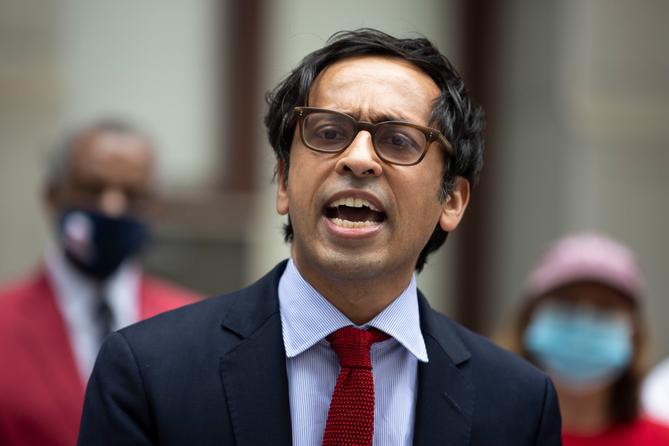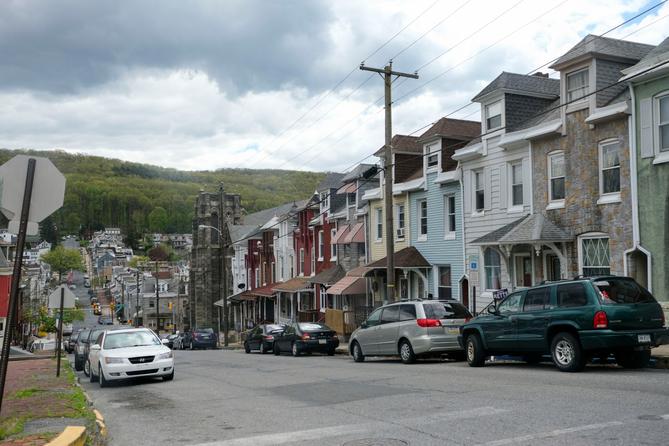Spotlight PA is an independent, nonpartisan newsroom powered by The Philadelphia Inquirer in partnership with PennLive/The Patriot-News, TribLIVE/Pittsburgh Tribune-Review, and WITF Public Media. Sign up for our free newsletters.
HARRISBURG — Pennsylvania lawmakers have agreed on a plan to use $2.2 billion in remaining federal stimulus money from the pandemic on housing, conservation, and child care programs.
The agreement came as the state finalized a $45.2 billion budget a week after the deadline.
None of the money will be used for direct payments to Pennsylvanians, as Democratic Gov. Tom Wolf had called for. Instead, Spotlight PA identified 20 programs that will be funded using the stimulus dollars. Here’s an overview of the spending:
Conservation and clean water
A total of $640 million, the biggest chunk of spending, will go to conservation efforts that include ensuring clean water for state residents, the rehabilitation and repair of state parks, and maintaining water and sewer systems.
Of that, $320 million will be transferred to a preexisting state program that helps water authorities big and small with drinking water and storm sewer projects, flood control projects, and to repair unsafe dams.
Another $220 million will fund efforts to preserve farmland and clean up farm and mine runoff that may harm the state’s water supply.
Finally, the budget provides $100 million for the rehabilitation, repair, and development of state parks and forests.
The latter programs are a continuation, in all but name, of two similar programs from the late ‘90s and mid-2000s that also focused on watershed management and park repairs.
The former will help Pennsylvania avoid legal trouble for not doing its share to clean up the Chesapeake Bay, where much of the state’s waters flow, said David Hess, a former Pennsylvania cabinet secretary who helped run the first iteration of the program.
As for the latter, state parks have $1.4 billion in deferred maintenance, Hess said, and “a lot of people saw how valuable parks and forests are for recreation during the pandemic.”
Housing
Lawmakers directed $375 million to help low- and middle-income homeowners and landlords fix their properties, and to increase or shore up the state’s affordable housing units.
Of that, $125 million will fund a program modeled on the Whole Homes Repair Fund from state Sen. Nikil Saval (D., Philadelphia).
“I thought there were issues that cut across geography — that cut across rural, urban, and suburban areas,” Saval said, one of them being that “everyone has a right and deserves a home that is safe, dry, and healthy.”
The Whole Home Repair Program will award grants and loans to homeowners and landlords to make repairs to their properties. Funding is restricted to homeowners whose household income does not exceed 80% of the area’s median income and to landlords who own fewer than 15 properties.
Two other programs were designed with the intent to improve and increase the number of affordable housing units.
The Housing Options Grant Program will award $100 million to developers and nonprofits that are building, acquiring, or rehabbing affordable housing for low-income tenants. The second program, funded with $150 million, will help agencies developing affordable multifamily rental properties recoup rising construction and material costs.

Property tax relief for older Pennsylvanians
The stimulus money will also fund a temporary 70% expansion of an existing state property tax relief program for people 65 or older and those with disabilities.
Typically funded by the Pennsylvania Lottery, the program will get a one-time $140 million infusion.
Last year, the program provided checks to 430,000 renters who make under $15,000 and homeowners who make under $35,000. Someone who received the maximum refund of $650 will receive an additional $455 under the one-year expansion.
Child care
Under the Department of Human Services, the Child Care Stabilization Program will award grants to child care providers to retain staff charged with the direct supervision of children or environmental services.
These one-time payments are meant to supplement existing staff wages and max out at $2,500. The program will accept applications on a rolling basis until the $90 million appropriation is spent or until the federal money expires in 2026.
Nursing homes
The plan directs $250 million in one-time payments to a number of long-term facilities and services including nursing homes, home health care agencies, and adult daycare services.
Law enforcement
The spending plan also includes $260 million in grants for law enforcement agencies to upgrade their technology, support recruitment efforts, and prosecute gun violence.
The Local Law Enforcement Support Grant Program will provide $135 million to agencies for reasons including the purchase or upgrading of new equipment, hiring nontraditional police personnel such as crisis-intervention specialists, and funding retention and recruitment efforts.
The grants are meant to supplement the amount of money law enforcement agencies are allocated in the budget. The program caps grants based on the size of the city — Philadelphia, the only first-class city in the state, would receive $25 million at most.
Another measure, the Gun Violence Investigation and Prosecution Grant Program, has a more limited purview. The program would provide grants to county district attorney offices and law enforcement agencies to investigate and prosecute firearm-related crimes. The bill directs the program to focus on areas with high rates of gun violence, but reserves 10% of funding for rural areas.
The plan also provides $75 million in grants for district attorneys, community organizations, and higher education institutions for violence intervention and prevention.
Mental health
The budget also creates a Behavioral Health Commission for Adult Mental Health — made up of legislators, cabinet secretaries, law enforcement, health care industry officials, and experts — and sets aside $100 million to address problems it identifies.
Miscellaneous
Outside of those big-ticket items, the plan also directs $3.8 million in stimulus money to public libraries, $15 million to arts and culture nonprofits, $3 million to biotech research, $25 million to utility relief, $1.4 million in emergency pandemic relief to nonpublic schools, and an additional $35 million to a student loan relief program for nurses that was created last year.
Finally, the plan transfers up to $42.33 million to the state’s Unemployment Compensation Trust Fund, which pays for jobless benefits for people who are out of work. Business groups had pushed for such a transfer to ward off an increase in their own unemployment fee rates.
WHILE YOU’RE HERE… If you learned something from this story, pay it forward and become a member of Spotlight PA so someone else can in the future at spotlightpa.org/donate. Spotlight PA is funded by foundations and readers like you who are committed to accountability journalism that gets results.

